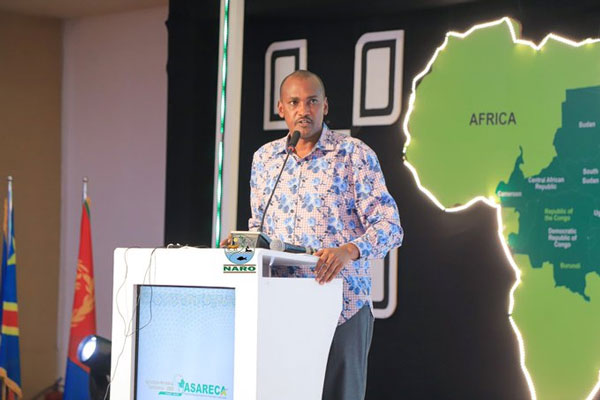
Kampala, Uganda | THE INDEPENDENT | The three-day multi-sectoral conference on food security in Africa has concluded in Kampala with a strong call for scientists and researchers to play a more active role in addressing climate change, sustainability, and challenges in food chain production and marketing. While scientists and researchers often make significant innovations, there is a pressing need to bridge the gap between research and the market.
Many groundbreaking solutions remain underutilized due to this disconnect, which demands immediate attention. Organized by the Association for Strengthening Agricultural Research in Eastern and Central Africa (ASARECA) and held at Speke Resort, Munyonyo in Kampala, the conference brought together governments, researchers, and civil society organizations committed to achieving food self-sufficiency in Africa.
Participants from ASARECA member countries, including Uganda, Burundi, Kenya, Somalia, Ethiopia, DRC, Central African Republic, Tanzania, Sudan, South Sudan, Eritrea, Cameroon, and Rwanda, convened under the theme “Building Resilient Food Systems to Feed Africa for Generations.”
The conference featured a ministerial meeting of patron ministers from member countries, along with discussions, knowledge sharing, and an exhibition showcasing participants’ work from different countries. In his closing remarks, the Agriculture, Animal Industry, and Fisheries Minister, Frank Tumwebaze, expressed his disappointment with economic planners who allocate insufficient funds to the agricultural sector.
He emphasized the need for adequate investment in agriculture to address food inflation and urged scientists and researchers to disseminate their findings and innovations directly to farmers. He highlighted the importance of addressing challenges such as land scarcity, and climate change, and leveraging technology to enhance the benefits of the food chain.
“Going forward from the #AAMC2023, Agricultural Research Institutions should ensure that products from research are not only adaptive but impactful. Agriculture should also be developed in ways that do not negatively affect other sources of livelihood,’’ – Hon. @FrankTumwebazek pic.twitter.com/Hke87j8kkR
— MAAIF
(@MAAIF_Uganda) May 19, 2023
The under-secretary in the agricultural ministry, Ssegawa Gyagenda Ronald, representing the Permanent Secretary, echoed the President’s call for better compensation for scientists. He acknowledged their crucial role in solving Africa’s problems and stressed the importance of making their innovations affordable for end-users.
The conference took place against the backdrop of strained international food chains due to the COVID-19 pandemic between 2020 and 2022, as well as the Russia-Ukraine war, which further impacted economies and livelihoods, particularly in developing countries. During the ministerial conference, patron ministers issued a communique outlining key resolutions.
These included advocating for increased funding for agricultural research, mobilizing partnerships for agricultural support, prioritizing assistance to small vulnerable players, promoting the adoption of new technologies and innovations in food chains, prioritizing resilient food crops and climate-smart approaches, and enhancing data sharing and utilization in policy formulation.
At the institutional level, it was agreed that the directors-general of national agricultural research institutions from member countries would become members of the ASARECA board. Additionally, nationally recognized private and civil society umbrella organizations would be represented, and each regional economic block would have a representative.
Ambrose Opio from Oxfam emphasized the need to protect and support vulnerable communities affected by land grabbing, lack of financial capital, gender-insensitive policies and laws, and technological disparities. He warned against the growing dominance of corporate power in food production and distribution systems, which poses a threat to the livelihoods of the poor.
Oxfam pledged ongoing support to small farmers through training, organizing cooperatives, and providing platforms for their visibility in decision-making processes. The conference underscored the importance of treating women and youth employed in the food production and distribution chain with dignity, as they often face challenges in accessing fair opportunities.
*****
URN
 The Independent Uganda: You get the Truth we Pay the Price
The Independent Uganda: You get the Truth we Pay the Price



